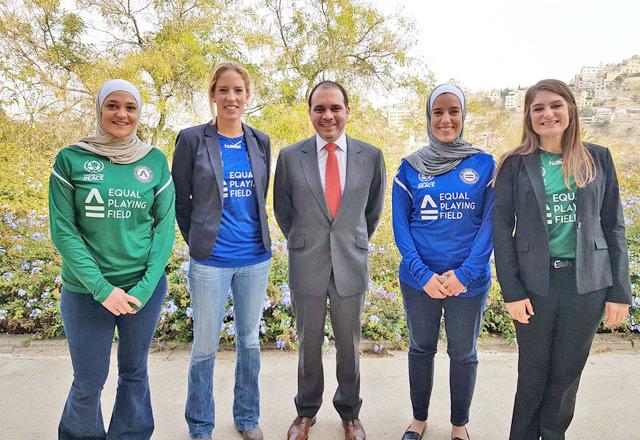You are here
‘Stand up and fight’: Albanian women footballers break taboos
By AFP - Mar 06,2023 - Last updated at Mar 06,2023
ELBASAN, Albania — Emanuela Rusta battled combative crowds and misogynistic headlines for years as she navigated Albania’s football scene before becoming the country’s first female international referee.
Rusta has been one of the leading figures pushing for more equality on Albania’s football pitches, where entrenched sexism has kept women on the sidelines.
“You have to fight hard to be accepted,” the 29-year-old told AFP. “We have to shatter the glass ceiling.”
Football has long been a national obsession but women have started to make inroads only recently.
The women’s national team first competed in 2011, while the Albanian Football Federation (FSHF) remains overwhelmingly male-dominated with just 2,000 female members compared to 22,000 men.
Wracked by decades of poverty, authoritarian rule and mass migration, Albania has grappled with an uneasy path to global integration since its communist government collapsed in the early 1990s.
Many people have clung to their traditions, including deeply rooted ideas of gender, especially in rural areas where women have had fewer opportunities.
But things are beginning to change with women increasingly working in leadership positions as judges, university presidents and playing a major role in government.
The sporting world has slowly come around, including its football scene, where rowdy crowds and occasional scuffles at men’s games are not uncommon.
Undeterred
Despite the hurdles, Rusta remained unfazed in the face of local media headlines such as “the sexy referee who turns up the heat”.
Refereeing “is not a question of gender but of competence”, said Rusta, who has refereed at a dozen international matches in European stadiums and hopes to be selected to work at the men’s World Cup.
“In order to make good decisions, you have to know the rules of the game perfectly, but you also have to be in excellent physical condition and have a great capacity for concentration,” she added.
To support her career, Rusta works as a physical education teacher at the high school in her hometown of Elbasan and trains in the afternoons.
She hopes to be the head referee for the Albanian League 1 derby between the capital’s two rival teams, Tirana and Partizani.
“A woman referee eases tensions and normalises the situation,” said sports analyst Andi Vrecani.
The history of women’s football is deeply rooted in Albania’s northern city of Shkodra, where the club Vllaznia first made a name in 2009.
In just a few years, the team has dominated domestically and gone on to play against Europe’s best teams, including Chelsea, Real Madrid and PSG in the group stage of the 2022-2023 Champions League.
“The key to the success of the team lies with the girls, who have managed to break the myth and prejudice that football is only a male sport,” said team President Lazer Matija.
Crucial to their recent success has been 26-year-old striker Megi Doci.
Originally from a poor village in northern Albania, Doci took up football against her mother’s wishes and moved to Tirana at the age of 12 to pursue her passion.
Things were not easy, she admits, even as she racked up impressive accolades, including prizes for best striker and most valuable player.
“I have fallen, I have suffered, I have cried, I have had to swallow my tears, but each time I have chosen to stand up and fight,” she told AFP, saying she hopes to join the women’s team of Bayern Munich or Real Madrid in the future.
Doci regularly trains four hours a day with men, who are often surprised by her presence on the field.
“It’s a challenge, you can feel the weight of this mentality still present because they are not used to seeing a girl play,” she added.
‘We have won’
Others have broken boundaries while juggling the demands of an athletic career with the desire to start a family.
“I never wanted to choose between my career and my personal life, I always wanted to be happy in both,” says Ardiola Raxhimi, 24, the mother of a two-year-old boy she had with Muhamet, a former footballer who now runs a barber shop.
FSHF head Armand Duka said that “women’s football is the priority” of the governing body, which is hoping to see the number of female footballers soar.
But he acknowledged that parity is a long way off.
Female players are paid almost half as much as male players, with their average salary fetching just 400 euros ($425) a month.
And while many hurdles remain, Duka believes the path ahead has taken shape.
“A few years ago, women’s football was almost a taboo because it was considered a male sport,” he said. “We have won that battle.”
Related Articles
AMMAN — With the aim of promoting the upcoming AFC Women’s Asian Cup (WAC) scheduled to be held in Amman between April 4 and 20, 2018, a glo
Early in the morning, before the heat of the day, dozens of women wearing broad-rimmed hats, hand-pick the magnificent signature-blue flowers that attract clouds of butterflies and bees.
KUCOVA, Albania — Albania unveiled a newly refurbished NATO-backed airbase on Monday, highlighting the alliance’s expanding footprint in sou













